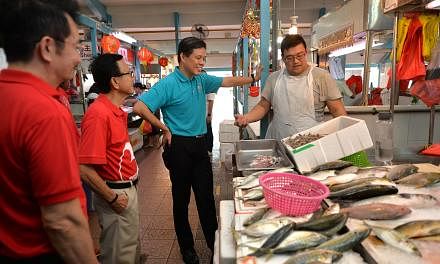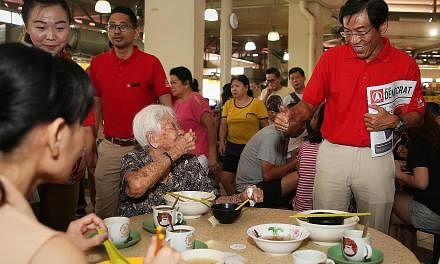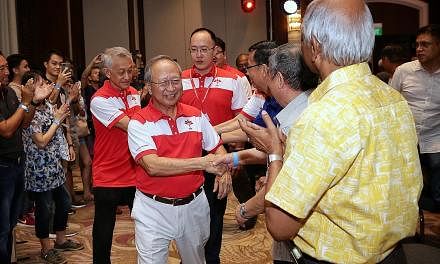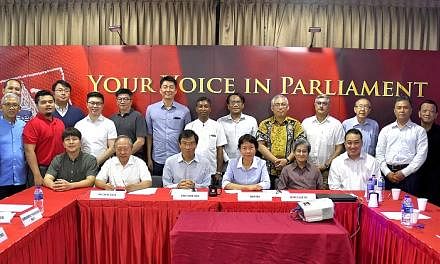BEIJING - It is unrealistic to think that the US and China can resolve their trade dispute in a few meetings, but if the two sides can agree on a number of key issues first, it would be important progress that will restore global confidence, Singapore Deputy Prime Minister Heng Swee Keat has said.
Trade conflict between the world's two giants is negative for the global economy and Singapore will continue to be affected if the situation deteriorates, he warned.
The Republic is taking steps to stem the fallout, easing its monetary policy just a few days ago by adopting a slower rate of appreciation of the Singapore dollar.
"I do not see a need at this stage for any extraordinary measure. Budget 2020 is coming up in a few months' time and we will continue to monitor the state of the global economy and there are many sectors in our economy that are still growing," Mr Heng, who is also Finance Minister, told Singapore reporters in Beijing on Thursday (Oct 17).
Trade negotiators from the US and China recently reached a partial agreement that in effect kicked the can on harder-to-resolve issues down the road.
While some analysts have expressed scepticism about whether the two sides can eventually sign a deal, others saw the development as a good first step.
Singapore's finance and insurance sectors are growing, as is the information and communications technology industry. Infrastructure projects can also be brought forward to support the construction industry, said Mr Heng at the end of his four-day visit to China for an annual bilateral cooperation meeting.
"What we need to continue to focus on are structural policies that will put our economy on a very different trajectory, and there the industry transformation maps we have launched is an important element of our structural policies."
Mr Heng said he had discussed with Trade and Industry Minister Chan Chun Sing on having more extensive consultation with business leaders in the next few months, as they prepare new measures to tackle this transformation.
The Deputy Prime Minister met Vice-Premier Liu He, who is China's lead trade negotiator, earlier on Thursday.
"Premier Liu and I shared many common views on how we need to all restructure our economy and how we need to find opportunities to grow with one another and I think he's taking a very positive approach in this with the US as well, and I hope that there can be an early resolution for some parts of the disagreement," he said of the long-drawn trade dispute between the world's two largest economies.
Mr Heng led a team of Singapore's fourth-generation leaders to attend the annual Joint Council for Bilateral Cooperation (JCBC) meeting in the south-western city of Chongqing on Tuesday.
The JCBC, started in 2004, is the highest-level cooperation summit between the two countries and is co-chaired by the deputy prime ministers of both countries. Mr Heng's counterpart is Vice-Premier Han Zheng.
Besides being Mr Heng's first outing as co-chair of the JCBC since taking over from former deputy prime minister Teo Chee Hean, this year's talks was also significant because six fourth-generation, or "4G" ministers, and three senior ministers of state and ministers of state came along.
When asked how confident this 4G cohort is in dealing with the Chinese leaders, Mr Heng said preparatory works began when they were still junior ministers involved in various Singapore-China business councils.
"So the engagements did not just start. The engagements have been going on for a while," he said.
When asked how the younger leaders could be more effective in engaging with China in the years ahead, Mr Heng responded: "If you look back at the cooperation that we have had with China over the years, it has to be relevant to both countries' needs and we have to bear in mind that whatever we do, Singapore must stay relevant and useful not just to China but to the world."
"And it is important for us to look at how we can play a role at the various stages of the different countries' development."
Singapore first collaborated with China by building the Suzhou Industrial Park some 25 years ago. Today, there are two more intergovernmental projects: Tianjin Eco-city and Chongqing Connectivity Initiative.
As China shifts its focus from developing cities in isolation, to having regional development blueprints, Singapore is well-placed to tap new opportunities, including under China's Guangdong-Hong Kong-Macau Greater Bay Area and the Beijing-Tianjin-Hebei regional plans.
"We have a very good head start, because in many of these key regional development areas, we have had bilateral councils for a number of years now," said Mr Heng.
Singapore has eight business councils with China, including the Singapore-Shanghai Comprehensive Cooperation Council established in April this year.
It is also keen to have more financial tie-ups with China, something the central banks of the two countries will be working on.
Turning to Singapore's upcoming general election, Mr Heng said the ruling party has been making preparations all along, and it now has a "fairly good slate of candidates".
As the People's Action Party has a policy of regularly renewing its political office-holders and parliamentarians, it has been interviewing a wide range of potential candidates.
"But of course, until the election itself, we will continue looking for candidates so we can have a stronger team in the coming years," he said, adding that the administration has been working since the last election to deliver what was promised to voters.








